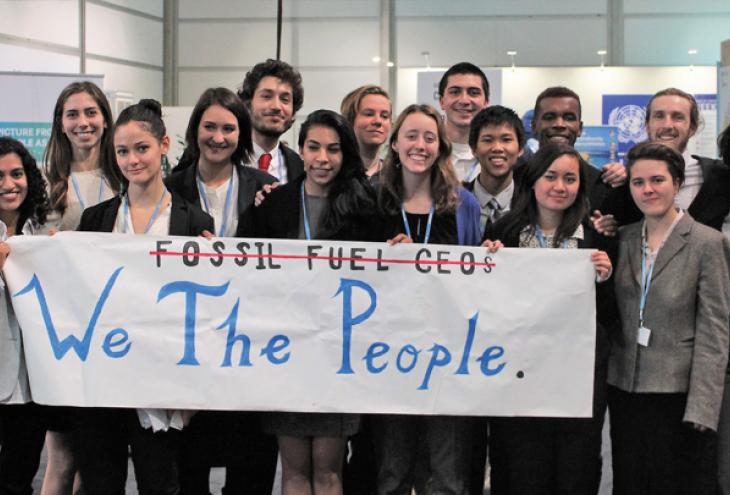Why I disrupted a White House panel at the U.N. climate talks
Like many members of my Indigenous family, I watched the events at Standing Rock unfold with a daily struggle of emotions ranging from heartache to pride to anger to gratitude. Physically, I was 1,200 miles away. I felt powerless, stuck behind a desk at Ohio State University pursuing my PhD. My Indigenous community played a significant role in propelling me through higher education to that desk. I knew I had my own role to play to support my relatives and their struggles at Standing Rock.
A year later I found myself in Bonn, Germany, at the United Nations Climate Change Conference (COP23), one of 15 youth from across the U.S. in the Sustain US delegation. Throughout the two weeks of the conference, I participated in the International Indigenous Peoples’ Forum on Climate Change, interacting daily with global Indigenous people. We fought for full participation in the negotiations that impact our people through a formal platform within the U.N. After countless hours of work, we finally won one spot in the room — one seat to represent the Indigenous across the world. This win was jaded even further as the representative would have no decision-making power.
Although it was only a small step toward bringing Indigenous voices to international negotiations, the win taught me an important lesson: action needs to occur within our society because the bureaucratic process is slow. Recognizing Indigenous sovereignty and protecting the world’s people are urgent issues, and we all need to play a role in shifting the culture of today’s society.
While working to bring attention to Indigenous issues, I had the opportunity to participate in the biggest story of the conference. When the White House announced that its only official event at the conference would focus on “clean fossil fuels,” our delegation decided to stand up to mute our government’s powerful voice so others could be heard. We recognized that the fossil fuels the United States was promoting would be coming from “sacrifice zones,” including reservations and offshore oil rigs. This solution impacts the health and ecosystems of those communities, not those in Washing-ton making the decisions. Just solutions will require building up the economies of zones that are already impacted so they can transition away from fossil fuels toward renewable energy. In the case of Indian land, recognition of tribal sovereignty is required so each nation can make its own decisions.
Our delegation partnered with an international community to counter the White House story. We filled the majority of seats at the panel, and after hearing the panel present for about 15 minutes, we began singing to the tune of “God Bless the USA”: “So you claim to be an American/ But we see right through your greed./ It’s killing all across the world, for that coal money./ So we proudly stand up until you/ Keep it in the ground. / We the people of the world unite,/ And we are here to stay!”
As we sang “stand up,” about 100 people rose to their feet and continued to sing. Afterward, we marched out and joined another 100 people outside the room, where we held our own People’s Panel along with the Indigenous Environmental Network. Our panel had a full audience, nearly emptying seats at the White House panel.
The story of our protest was reported by almost every major media outlet, including a front-page feature in The New York Times. Securing my place at the U.N. came through the responsibilities that prevented me from joining my relatives at Standing Rock. It was the role I was searching for, and I learned how much power people can truly exercise as they bring their stories and experiences together to fight for change. Whether that change unfolds within politics or in our society, time will tell. We each just need to play our part.














